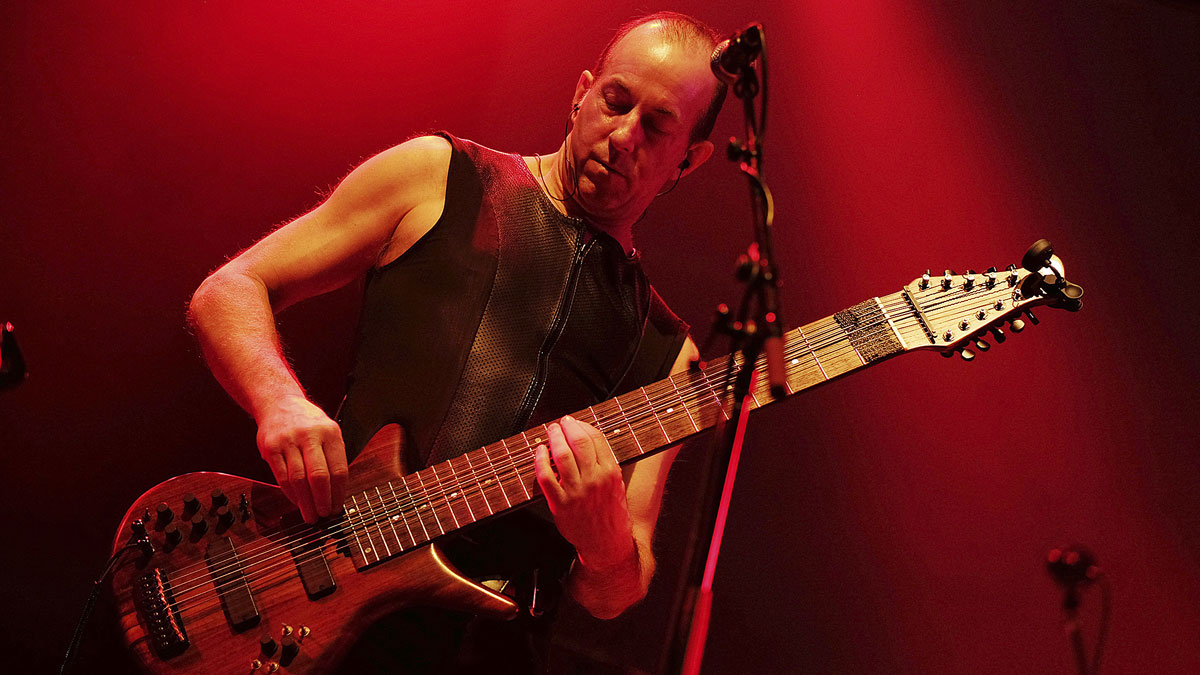Trey Gunn on starting out, King Crimson and playing a 10-string guitar
The Crimson man on his unique musical path

Introduction
With the release of the 16-disc Thrak box set, we asked King Crimson’s Trey Gunn to fill us in on the intricacies of playing a 10-string.
During the mid-1990s Thrak era, King Crimson’s line-up comprised two guitarists and two drummers with Tony Levin and Trey Gunn holding down the more subterranean side of things.
Trey’s unusual choice of sonic weaponry was made for him by Mark Warr - a mighty 10-string instrument that encompassed both bass and guitar ranges - which meant that he could produce anything from a thunderous low end to high melodic counterpoint for guitarists Adrian Belew and Robert Fripp. So, did he start out on bass or guitar? “Neither,” he chuckles…
Sort Out Your Priorities
“I started out as a piano player for many years, then bass guitar and then guitar. I was in a lot of different bands in high school, but I opted out of going to college for a couple of years and worked in a construction company and studied jazz guitar.
In 1981 you either went to GIT or Berklee, and I looked at both those places and felt nauseous being there
“Even though I was pretty much in the punk-rock world where the attitude was ‘don’t know anything’, I always thought that was fucked up. So I ended up studying jazz guitar. I was living in South Texas and there was a jazz guitarist there who had students and I studied with him for a while.
“Then, eventually, I realised I needed to go to college and study music. I just wanted to know more about how this whole thing fits together.”
Beware Of Geography
“I was not aware of King Crimson until 1980. I had a friend whose older brother had the first record and I heard it when I was 13, but then I just didn’t hear the band again until 1980. Thinking about it, I heard Fripp and Eno in ’78 or ’79, but that still didn’t draw me over to Crimson.
“It’s weird, Texas was kind of off the map - it wasn’t the East Coast or West Coast. However, we had this kind of hard-rock scene and Crimson actually played in my hometown many times, which is freaky, because it’s kind of a desolate, off-the-beaten-path place.”
Customise Your Curriculum
“I went to the University of Oregon and I didn’t study performance, because I didn’t want to play classical music. I studied composition, which kind of gave me the chance to not spend so much time on an instrument.
Whenever I picked a guitar up, it felt like the ghost of Eric Clapton was hovering over my shoulder
“I was just trying to steal all the techniques and ideas that I could on the sly! There weren’t that many options in 1981: you either went to GIT or Berklee, and I looked at both those places and felt nauseous being there.
“So I went leftfield, and studied classical composition. At the same time, I was playing in as many punk bands as I could and working in a recording studio. Then I heard Crimson’s Discipline and Mahavishnu’s Visions Of The Emerald Beyond. Those records just blew me to pieces. So that was when Crimson first hit me and knocked me over.”
Exorcise Your Ghosts
“Whenever I picked a guitar up, no matter what I did, it felt like the ghost of Eric Clapton was hovering over my shoulder. There was this blues thing that was still there and, for a lot of people, that’s a virtue, but for me, it just felt a bit phoney.
“It wasn’t the guitar itself that was feeling off to me, but the tuning; it’s the 4ths tuning - that’s where the blues is - and that was when I started to think, ‘What can I do?’
“About 12 months later, I discovered 5ths tuning. As soon as I put that on the guitar, it was, ‘Oh, shit!’ The 4ths didn’t work for me, but the 5ths did, and that’s when I started to follow that path.”
Don't Miss
Adrian Belew talks Crimson ProjeKCt, gear and Nine Inch Nails

When The Pupil Is Ready…
“If this was 300 years ago, I would have found a master musician and frickin’ worked in his garden or whatever I needed to do to learn from him. Why don’t we do that today? Why isn’t John McLaughlin my teacher? And I thought, ‘I should just contact these guys.’
“So I made this fairly extensive list of all the people I thought were great musicians and as I went through the list, it seemed like most of them you couldn’t really learn something from - but then Robert Fripp’s name kept popping up to the top.
“Whereas with Bowie and Gabriel, it feels like they just do what they do, with Robert, it seemed like he had the capacity. Three months later I saw in DownBeat magazine that he was teaching guitar. I thought, ‘Okay, I’ve got to go.’”
Resistance Is Futile
“When Robert Fripp asks you to be in King Crimson, you don’t really say no! I had been working with Robert for many years on a lot of different projects with the String Quintet and The California Guitar Trio.
When Robert Fripp asks you to be in King Crimson, you don’t really say no!
“I had a sense that he was playing around with Crimson ideas and we were working together, playing around with vocabulary, and so when he asked me, it wasn’t a surprise. It was pretty daunting at first!
“The awesome thing was that we played enough shows so that when it came time to record Thrak, it was really frickin’ quick - I mean, I think it was two weeks. The first week, we had all the tracks done and then it was just overdubs and vocals.”
Question Conventional Technique
“I play both sides in 5ths and the strings are an octave apart from each other so everything is identical - mirrored - and your hands are crossed. There’s this really strange kind of satisfying symmetry.
“Other guys do what they call ‘uncrossed’ where the bass strings are on the outside and the high strings are in the middle. I knew that I wanted all 5ths, but I get that it looks totally different from a guitar and probably if you picked one up you’d be utterly lost because of the tuning and the string configuration.”
The Gears Of Warr
“At the time, I was kind of having to cobble together something, because the Warr is full range and there are bass strings that need to function as a real bass guitar. So I would send half the instrument to some kind of a bass rig and the other half to some kind of guitar rig.
I’ve always had some bass processing and guitar processing and then usually kept the signals separate for the sound man
“I’ve always had some bass processing and guitar processing and then usually kept the signals separate for the sound man. Now I’m running one Fractal Axe-FX and it’s fucking amazing.
“It sounds the best I’ve ever sounded and I’m able to use the CPU to process the bass and the guitar separately and even mix them together myself and just send a stereo mix to the house and that’s it - or I can send out three outputs where the bass is a mono and the guitar is left and right.”
Home In On The Range
“The Warr’s bottom string is a low C below electric bass and I was using a 0.128 all the way up to 0.009 on the top.
“When you hit the 0.128 in the middle of the neck, it’s an enormous sound, and when you hit the top it’s pretty small, even though the Bartolini pickups are custom wound. So, I ended up using two compressors on the bass: an [Empirical Labs] Distressor at 20:1 to catch the loudest things and then a DBX.
“I learned this trick from Tony [Levin], which is no big deal now, but at the time he figured out that if you want distortion on the bass you have to mix the direct signal in as well.
“Now we have millions of ways of doing that, but at the time, it was really goofy. So I would use a [Line 6] Bass POD as distortion and mix it back together through another compressor.
“On the top side, I used a Sansamp - I used different kinds of distortion - and then I had a TC Electronic G-Force for a couple of years and an Eventide for a while.”
King Crimson’s limited-edition 16-disc Thrak boxset is available now via Panegyric
Don't Miss
Adrian Belew talks Crimson ProjeKCt, gear and Nine Inch Nails

